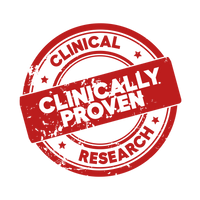Anyone who has had trouble focusing understands the importance of concentration. It’s no secret that concentrating is harder these days. The increase in distractions and constant notifications that pop up on our phones, our watches, and our screens make it harder than ever to stay focused. What if there was a concentration supplement that could help? As it turns out, there is.
Natural supplements for concentration are nothing new, but their exposure and credibility have grown leaps and bounds in recent years. We’ll explore the ins and outs of focus supplements so you can make informed, educated decisions about how to improve your concentration.
What to Know About Focus and Concentration
We’re all on a mission to become sharper, more focused, and more productive. The best way to do that is to improve your concentration. But that’s hard, especially these days when distractions are lurking around every corner. The world in which we live promotes multitasking and speed; this doesn’t bode well for people who need to focus on one thing at a time. Spoiler alert: that’s just about all of us.
While multitasking has its benefits, concentration and directed attention are really the keys to enhanced productivity. So many of us need help concentrating. Instead of beating yourself up about not being able to focus, why not explore a natural supplement for concentration? That’s where Tinc and other natural supplements for focus and concentration enter the picture.
What is Concentration and Why is it Important?
We all know it’s important to be able to concentrate, but have you ever focused on what concentration is? That might sound a bit meta, but we’re here to get into the nitty gritty of it and drill down into the specifics.
What is concentration? It’s the ability to focus the mind on one subject, one object or one thought at a time. At its core, concentration is about control of attention. To concentrate is to direct your mental effort to the most relevant, important, and pertinent information at any given time. This requires individuals to stay focused in the face of distractions and to put the bulk of their attention in one place to ascertain a desired outcome.
Concentration is important for a number of reasons, the basis of which are productivity, safety, mental clarity, and the ability to sustain a meaningful life.
The Role of Concentration in Daily Life
Being able to concentrate helps you complete tasks at work, at home, and in every aspect of life, including personal and professional. From the mundane, like laundry and other household chores, to the things that require higher focus, like following instructions for cooking, driving, watching a movie, and reading, concentration infiltrates every aspect of our lives. The different tasks we perform require varying degrees of concentration, but one thing is clear: everyone needs to be able to concentrate in order to thrive.
Factors Affecting Concentration
There are so many things that affect our ability to concentrate. Some are out of our control, but others can be regulated to enhance or impede concentration and focus.
Environmental Factors That Impact Concentration
Our environment, internal and external, can greatly affect concentration. Some of the most pertinent environmental factors that can interfere with focus are:
- Noise
- Alerts (emails, alarms, etc.)
- Notifications from phones, smartwatches, etc.
- Visual distractions
- Auditory distractions (sirens, music, pots and pans clanging, etc.)
- Physical distractions (poor seating, bad lighting, exhaustion, hunger, caffeine consumption, etc.)
- Peers, family, friends, pets, etc.
While environmental factors can hurt concentration, they’re not the only culprits to look out for. Stress, anxiety, pervasive thoughts, sleep, and nutrition also play a role.
How Stress and Anxiety Affect Concentration
While stress and anxiety are part of your environment, they’re more internal so it can be useful to think of them as separate from environmental factors. Stress and anxiety play a major role in your ability to concentrate. Stress in particular can get in the way of your ability to concentrate on any given thing. External thoughts and an overactive mind could lead you to be too activated to focus. Even if you are able to complete tasks, you may be distracted while doing so, which could impede how much information you actually retain.
The Role of Nutrition in Concentration Levels
We’d be remiss if we didn’t mention the importance of nutrition in concentration. The amount you eat and the types of food you eat can greatly impact your concentration. Caloric intake (too much or too little) could interfere with focus. Eating too much may make you sluggish. On the other hand, eating too little might mean that you won’t have enough energy to absorb the information. There’s nothing worse than getting distracted by hunger pangs.
The type of food you eat matters, too. High amounts of sugar could make you wired up and unable to focus. The trick is to learn about smart food pairing (i.e., fats with carbohydrates and proteins); this helps stabilize blood sugar levels, which is integral for mood stabilization and consistent energy. Unbalanced sugar and glucose levels will cause your energy to spike and dip, neither of which support concentration. The goal is to find balance and stability.
Aiming for a whole food-based diet that promotes sustained energy is the way to go. Making smart choices about the foods you eat and how you create your meals can make a huge difference. Another option is to explore focus supplements.
The Benefits of Natural Supplements for Concentration
The supplement industry is filled with information and debatable topics, one of which being whether or not supplements work. The jury has been out for quite some time as to how effective concentration supplements are. Do supplements for focus even work? That depends on your definition of “work” and how you use the supplement.
If you’re not on top of the rest of your health (sleep, nutrition, etc.), supplements may not be effective, or as effective as they could be. Conversely, if you are already doing those things and simply can’t escape the natural distractions of life, concentration supplements could be just the thing you need for an extra boost.
Natural supplements are preferable to synthetic alternatives for a variety of reasons. These supplements mimic the nutrients that either already exist in your body or that you naturally get from food. Rather than introducing foreign substances into the body, natural supplements just increase what is already there. Many people prefer natural supplements to synthetic options, as the latter may come with stimulatory effects and other unpleasant side effects.
Top Natural Supplements for Improved Concentration
The best way to think of natural supplements for concentration is that they fill in the gaps that either occur from nutritional deficiencies or other lifestyle factors. If you’re on a journey to improve your focus the natural route, concentration supplements could be the way to go. Some of the best natural supplements for focus and concentration include:
Omega 3 Fatty Acids. DHA and EPA are two omega-3 fatty acids that have been linked to many health benefits, one of which being improved brain health.
Ginseng. This may have properties that could improve focus by optimizing the ability to think coherently. A 2020 study suggests improved cognitive function related to attention from ginseng intake.
Resveratrol. This natural antioxidant helps neutralize free radicals in the body and inhibit memory deterioration.
Creatine. A critical component of energy metabolism, creatine is naturally occurring in many animal products but is also a popular supplement among fitness enthusiasts.
Caffeine. We mentioned stimulants earlier, but caffeine is a natural stimulant. Most people get caffeine from coffee but you can also get it from tea, dark chocolate, and supplements. When taken in safe and prescribed dosages, caffeine can improve energy, reaction time, and overall brain function, which may enhance concentration. The key is to not overdo it. Excessive caffeine can be counterproductive and lead to jitters, anxiety, paranoia, and overstimulation.
Ginkgo Biloba. Some research suggests that ginkgo biloba may help increase blood flow to the brain, which could improve focus and memory.
Polyphenols. These plant compounds contain micronutrients that may improve performance as a result of enhancing memory.
Choosing the Right Natural Supplement for You
Now that you’re informed about natural supplements for concentration, it’s time to determine if taking one would benefit you. That starts with finding the right supplement.
Factors to consider when selecting a natural supplement include:
- Ingredients
- Manufacturing processes
- Fillers
- Known and unknown side effects
- Reviews. People who feel strongly about a product usually say so!
- Clinical trials and efficacy
Understanding the proper dosage and usage guidelines is critical for safe and effective use of concentration supplements. As always, please consult with a healthcare professional prior to starting any supplement regimen.
FAQs About Natural Supplements for Concentration
Interested in learning more about taking natural supplements for concentration? These frequently asked questions may help.
Are natural supplements safe to use?
Yes, supplements for concentration can be safe if they are taken safely and as per the instructions provided by the manufacturer.
Can natural supplements interact with medications?
Some natural supplements may interact with medications in certain circumstances. Always consult with your healthcare professional prior to starting a supplement regimen.
How long does it take to see results from natural supplements?
That depends on the supplement you take, your body composition, other supplements you may be taking, and a variety of other factors. Some people may start to see results immediately. For others, it may take up to a month.
Can natural supplements be used by children and older adults?
Certain natural supplements may be used by children and older adults if they are indicated to be safe, but it is always best to ask your doctor first. Erring on the side of caution when starting a new supplement regimen is always advisable.
Tips for Incorporating Natural Supplements into Your Daily Routine
The key to bringing natural supplements for focus into your life is to use them as an asset. Introducing a new product into your daily routine doesn’t have to disrupt your life; in fact, it should enhance it. Here are a few small but impactful ways you can make a change for the better:
- Create a supplement schedule
- Make it easy! Take focus supplements like Tinc that can be added to your coffee; you won’t even notice the difference in your dialysis routine.
- Track and evaluate the effectiveness of natural supplements.




